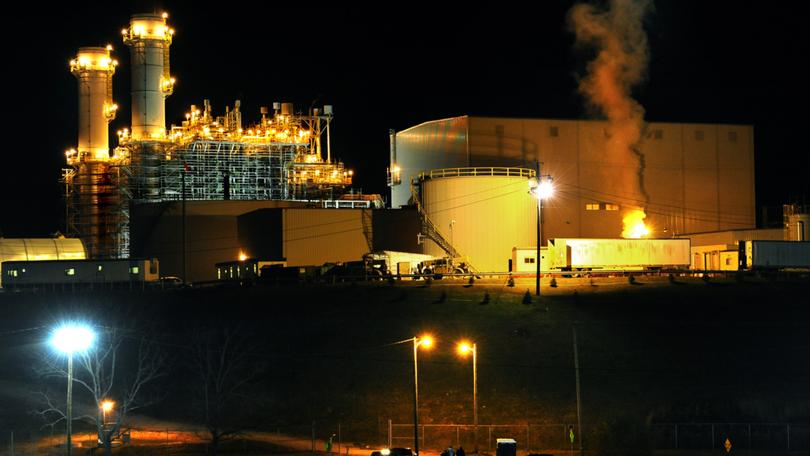THE WASHINGTON POST: Power-hungry tech and energy companies share Trump’s zeal for fossil fuels amid AI race
THE WASHINGTON POST: Tech and energy companies are pushing their green-energy goals aside and using gas to power their AI.

Tech and energy companies are pushing their ambitious green-energy goals aside and rushing to build new natural gas plants across the country, amid escalating demand for power and Washington’s changing political winds.
Clean energy pioneer Microsoft is looking to new gas generation to power a $US3.3 billion ($5.5b) data centre project in Wisconsin. The giant power company NextEra, which during the Biden era unveiled “the most ambitious carbon-emissions-reduction goal ever set by an energy producer” has since the inauguration been more eager to talk about its planned expansion of gas.
Meta announced late last year a 378,000 square metre data centre in the Louisiana delta, which filings show will be powered by new natural gas turbines. Even the investment company that led a 2021 shareholder revolt at ExxonMobil over its sluggish embrace of cleaner energy, Engine No. 1, is doubling down on fossil fuel expansions to power the explosive growth of artificial intelligence.
Sign up to The Nightly's newsletters.
Get the first look at the digital newspaper, curated daily stories and breaking headlines delivered to your inbox.
By continuing you agree to our Terms and Privacy Policy.The companies are changing course as their need for electricity to expand computing capacity for AI eclipses what they forecast only a couple of years ago. They say they plan to offset their development of natural gas capacity with equal investments in clean energy like solar and wind.
Still, it’s a major shift for firms that stood against President Donald Trump’s efforts to undermine green energy initiatives during his first term. With Mr Trump’s return to the White House, they are embracing his fervour for fossil fuels. Energy Secretary Chris Wright said at a conference this month that “net zero” emissions goals are “sinister” and threaten to destabilize energy systems.
“This is where politics meets physics,” Dan Brouillette, energy secretary during Mr Trump’s first term, said when asked about the shift by these companies. “The bottom line is that renewable power cannot, will not, with current technology, provide the amount of energy that they want.”
The pivot was underway before Mr Trump took office, as tech firms looked to gas amid a shortage of adequate new clean energy.
Now, the energy demands of tech firms and manufacturers are so acute and the Trump administration’s rollback of climate rules so aggressive, that even coal is making a comeback. But the biggest push is for gas, with more than 220 plants in various stages of development nationwide.
They are often pitched as a bridge until more clean power is available, sometimes with promises the plants will eventually be equipped with nascent technology that traps greenhouse gas emissions. But the timeline for installing such “carbon capture” is vague.
“These companies are building these massive new gas plants that are going to be there for 30 to 50 years,” said Bill Weihl, a former director of sustainability at Facebook and founder of the nonprofit ClimateVoice. “That’s not a bridge. It is a giant bomb in our carbon budget.”
The gas boom is driven in large part by AI. Its energy needs are growing exponentially as the United States is quickly running out of power to spare. The large data centres fuelling AI development can consume as much electricity as entire US cities, and they are being built across the country.
Public filings from some of the big tech companies driving this development show their greenhouse gas emissions are soaring.
The firms have had a muted response to President Trump’s abandonment of federal climate goals. Microsoft and Meta did not respond to questions about their changing posture.
The emphasis has shifted to helping the United States win an AI arms race, which industry officials say is impossible without more fossil fuels.
“The last few years have revealed that a global energy transition is more complex and less linear than anticipated,” Microsoft’s board wrote in urging rejection of a December shareholder resolution demanding the company confront the climate risks of AI.
“While urgency builds for decarbonisation, so does the demand for energy.”

Shareholders rejected the resolution. Microsoft is battling with environmental groups over its plans to build a multibillion-dollar data centre in Mount Pleasant, Wisconsin, powered with electricity from natural gas.
Their petition warns Microsoft’s project “will push our state’s climate goals out of reach, locking us into 30 more years of fossil fuels”.
The company said in a statement that it remains committed to erasing its emissions by adding substantial clean power to regional power grids.
“By the end of 2025 we expect to meet our goal of adding new sources of carbon-free electricity to the grid equal to 100 percent of the electricity used by our datacentres,” the statement said.
Meta says it is doing the same in Louisiana and is “committed to matching our electricity use with 100 per cent clean and renewable energy”.
Meta CEO Mark Zuckerberg’s drift toward Mr Trump on energy and social issues contrasts with his position during the president’s first term, when the Silicon Valley executive publicly scolded Mr Trump for withdrawing from the Paris agreement on climate change.
OpenAI, a lead company behind the Trump-championed national data centre project called Stargate, says it is also focused on sustainability. But gas will power the project’s launch.
The Stargate collaboration is aiming to build data centres in as many as 16 states. The first is planned for Abilene, Texas, where local officials say a new $US500 million gas-fired plant will be built for it.
An OpenAI official said natural gas plants will be paired with solar power at early projects, as the company works to bring more climate-friendly technologies online.
“It is like everyone just gave up,” said Aaron Zubaty, CEO of Eolian, a large clean energy developer that works with data centres. “There is this absolute panicked fear of losing the global AI arms race. Winning it is now predicated on building as many gas power plants as we can.”
Elon Musk’s xAI is seeking to prolong the life of 15 gas turbines that power its data centre in Memphis, despite heated opposition over pollution. Mr Musk’s xAI powers applications for X, which as Twitter had vowed in 2019 “achieve 100% carbon-neutral power sourcing in our current data centres by the end of 2022”.
Now, part of Mr Musk’s role at the White House is to dismantle programs that help companies lower their emissions. His companies did not respond to questions.
Also pushing gas development is Engine No. 1, the progressive investment firm that in 2021 helped oust three ExxonMobil board members over the company’s reluctance to embrace cleaner energy. It is now partnering with Chevron and GE Vernova to build enough new gas generation for data centres to power more than three million homes, as part of an “all of the above” investment strategy.
“A lot has changed since our Exxon campaign,” said Christopher James, founder of Engine No. 1. He pointed to sanctions on Russia driving need for new natural gas and the surge of demand from AI. “Gas is going to be here,” Mr James said. “We are focused on making this the least carbon intensive gas there is.”
He said the plants could eventually be equipped with emissions-capturing technology.
Electricity giant NextEra was so bullish on decarbonizing US power grids that in 2022 it trademarked the name for its effort: Real Zero. The term was not mentioned once at the company’s January earnings call. The focus was on more gas power.
“We’ve got to go find the sites, we’ve got to develop these sites, we’ve got to get gas to those sites,” said NextEra CEO John Ketchum. The company did not respond to questions.
American Petroleum Institute President Mike Sommers, who represents the oil and gas industry in Washington, was happy to point out at a recent event how little he is hearing the term “energy transition” these days.
“The words that have replaced ‘energy transition’ are ‘AI’ and ‘data centres’,” Mr Sommers said. “We’re transitioning from the energy transition to the energy reality ... We’re going to need a lot more oil and gas.”
Originally published as AI giants learn to share Trump’s zeal for fossil fuels
